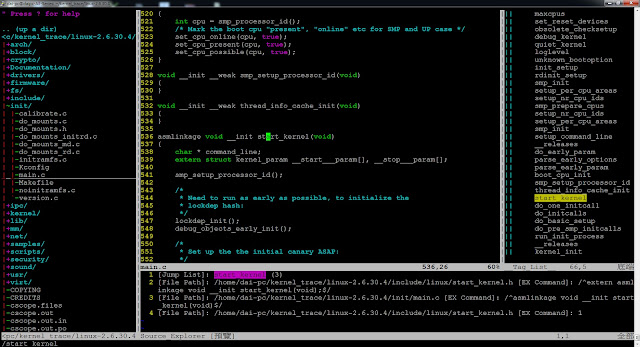[linux小心得]pthread小記錄
大家好 小弟又來嘴砲了。
紀錄一下 最近在測試書本 關於pthread範例,雖然此書 有些地方有打錯,
不過整體概念都算正確的。
先來一個 印出thread的id example
#include
#include
#include
/*thread ID, print process ID & thread ID*/
void * thfn(void * arg)
{
pid_t pid;
pthread_t tid;
pid = getpid();
tid = pthread_self();
/*Two ID change to number print*/
printf("the new thread: pid is: %u,tid is: %u\n", (unsigned int)pid,(unsigned int)tid);
return NULL;
}
int main(void)
{
pid_t pid;
int err;
pthread_t tid, mtid;
//int err;
pid = getpid();
mtid = pthread_self();
err = pthread_create(&tid, NULL, thfn, NULL);
/*error number same with errno,can use strerror function insert the easy language*/
if(err != 0){
/*can not use perror function,because error number not in errno variable value*/
printf("can't create thread %s\n", strerror(err));
exit(1);
}
/*sleep 1s,for check new thread be call in main thread before*/
sleep(1);
/*print main thread ID & process ID*/
printf("the main thread: pid is: %u, tid is: %u\n",(unsigned int)pid,(unsigned int)mtid);
return 0;
}
再來是有把struct 參數傳進去thread function的方法。
#include
#include
#include
typedef struct arg_struct ARG;
/*variable struct
* arg1:string
* arg2:int
* arg3:float
* use typedef the arg_struct type define ARG
* */
struct arg_struct{
char arg1[10];
int arg2;
float arg3;
};
/*thread,print the variable*/
void * thfn(void * arg)
{
ARG *p = (ARG *)arg;
/*print three variable*/
printf("arg1 is : %s, arg2 is : %d, arg3 is : %f\n", p->arg1, p->arg2, p->arg3);
return NULL;
}
int main(int argc,char *argv[])
{
pthread_t tid;
ARG arg;
int err;
/*give the three variable the value,struct should be define before create thread,create thread should be send the variable struct*/
strcpy(arg.arg1, argv[1]);
arg.arg2 = atoi(argv[2]);
arg.arg3 = atof(argv[3]);
printf("arg1 is : %s, arg2 is : %d, arg3 is : %f\n", arg.arg1, arg.arg2, arg.arg3);
err = pthread_create(&tid, NULL, thfn, (void *)&arg); /*create thread*/
if(err != 0){
printf("can't create thread %s\n", strerror(err));
exit(1);
}
pthread_join(tid, NULL);
//return 0;
}
下面這個證明 thread 存取資源的限制,一開始執行的時候 用cat test.txt是看不到東西的。
等執行完後才有
#include
#include
#include
/*variable struct,a heap pointer with process variable pointer to new thread*/
typedef struct arg_struct{
int * heap; /*Heap data's pointer*/
int * stack; /*stack data's pointer*/
}ARG;
FILE *fp = NULL; /*data object pointer,include stream buffer and data I/O*/
/*Process thread,change process Heap and Stack data value*/
void * thfn(void * arg)
{
ARG * p;
p = (ARG *)arg;
(*p->heap)++;
(*p->stack)++;
fprintf(fp, "new thread heap:%d stack :%d\n", *(p->heap), *(p->stack));
printf("the new thread done\n");
return NULL;
}
int main(void)
{
pthread_t tid, tid2;
ARG arg;
int * heap;
int stack, err;
heap = (int *)malloc(1 * sizeof(int)); /*allocate the heap space*/
if(heap == NULL){
perror("fail to malloc");
exit(1);
}
*heap = 2;
stack = 3; /*Stack data orgin 3 */
/**/
arg.heap = heap;
arg.stack = &stack;
if( (fp = fopen("test.txt", "wb")) == NULL){
perror("fail to open\n");
exit(1);
}
err = pthread_create(&tid, NULL, thfn, (void *)&arg); /*create thread*/
if(err != 0){
printf("can't create thread %s\n", strerror(err));
exit(1);
}
sleep(10);
(*heap)++; /*main thread ++ the heap & the Stack*/
stack++;
fprintf(fp, "main thread: heap:%d stack :%d\n", *(arg.heap), *(arg.stack));
printf("the main thread done\n");
fclose(fp);
free(heap); /*release the heap*/
return 0;
}
以上下台一鞠躬 感謝收看

留言